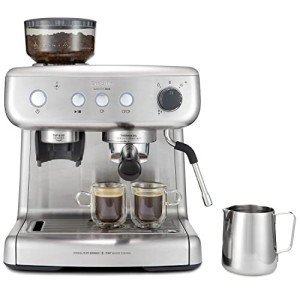Home Use Espresso Machines: A Comprehensive Guide
Espresso machines have actually become a staple in numerous families as coffee lovers look for to replicate café-quality brews in the comfort of their kitchens. The rise in appeal has resulted in a varied market filled with different designs, functions, and costs. Best Espresso Machines aims to offer an informative overview of home use espresso machines, helping readers navigate their options efficiently.
Comprehending Espresso Machines
Espresso machines work by requiring warm water through finely-ground coffee under high pressure, resulting in a focused coffee beverage known as espresso. There are numerous types of espresso machines categorized based upon their brewing approaches and level of automation. The most common types include:
- Manual Espresso Machines: These need the user to manage the pressure and water circulation, permitting a more hands-on coffee-making experience.
- Semi-Automatic Espresso Machines: These provide automatic control over water pressure, while the user by hand grinds and tamps the coffee.
- Automatic Espresso Machines: With the push of a button, these machines immediately control the circulation of water, making it easier to brew espresso with consistent results.
- Super-Automatic Espresso Machines: These all-in-one machines handle grinding, tampering, developing, and even milk frothing, making them perfect for users searching for benefit.
- Capsule or Pod Machines: These use pre-packaged coffee pods to develop espresso with very little effort, however they restrict option in brewing strategies and tastes.
Table: Comparison of Espresso Machine Types
| Type | Control Level | Reduce of Use | Cleaning Level | Suitable For |
|---|---|---|---|---|
| Manual | User-controlled | Moderate | High | Coffee purists |
| Semi-Automatic | Partial automation | Moderate | Moderate | Home baristas |
| Automatic | Completely automated | Easy | Low | Hectic individuals |
| Super-Automatic | Completely automated | Extremely easy | Very low | Convenience seekers |
| Capsule/Pod | Totally automated | Very easy | Extremely low | Casual drinkers |
Key Features to Consider
When choosing a home use espresso machine, it's important to think about different functions that can significantly impact the quality of espresso and user experience.
- Pressure: Look for machines that provide at least 9 bars of pressure, as this is thought about optimal for brewing espresso.
- Boiler Systems: Single vs. dual boiler systems figure out temperature stability and the ability to brew espresso and steam milk all at once.
- Grinder: Integrated mills allow for newly ground coffee, which enhances taste. Think about machines with adjustable grind settings.
- Milk Frother: For those who delight in coffees and lattes, an integrated steam wand or automatic frother is vital.
- Size and Design: Consider your cooking area space and visual preferences. Machines come in different sizes, from compact to large setups.
- Price: Home espresso machines can vary from a few hundred to several thousand dollars, so it's essential to establish a budget before exploring alternatives.
Advantages and disadvantages of Home Use Espresso Machines
| Pros | Cons |
|---|---|
| Convenience of brewing coffee in the house | Initial investment can be high |
| Quality of espresso is frequently exceptional | Needs some skill, specifically with manual machines |
| Capability to experiment with tastes | Upkeep and cleansing can be labor-intensive |
| Can conserve cash in the long run | Not all machines will match every coffee choice |
Maintenance and Cleaning Tips
Keeping an espresso machine is important for extending its life and guaranteeing constant brew quality. Here are some useful suggestions:
- Regular Descaling: Minerals from water can develop in the machine. Descale every 1-3 months, depending upon water hardness.
- Daily Cleaning: Rinse portafilters, baskets, and steam wands after each use to prevent coffee oils from developing residue.
- Use Filtered Water: This can help minimize mineral buildup and improve the taste of coffee.
- Change Gaskets and Seals: These elements might wear out over time and ought to be changed to keep pressure and performance.
- Read the Manual: Each machine has particular care directions; following these will ensure longevity.
Frequently Asked Questions About Home Use Espresso Machines
Q1: What is the best budget espresso machine?The best budget espresso machine often depends on individual needs, however designs like the DeLonghi EC155 or the Breville Bambino are popular among users for providing excellent value. Q2: How long do home espresso machines usually last?With correct maintenance, home espresso machines can last anywhere from 5 to 15 years, depending on the quality of the machine and frequency of use. Q3: Can I make coffees and lattes with any espresso machine?While most espresso machines can make cappuccinos and lattes, having a trustworthy
steam wand or frother is important for attaining the ideal milk texture.
Q4: Are super-automatic machines worth the investment?For those who prioritize benefit and quick brewing, super-automatic machines can be worth the financial investment, though they might lack some customizability in brew strength and flavor. Q5: What types of coffee beans are best for espresso?While personal choice plays a function, beans identified as" espresso "blends are typically roasted darker, developing abundant tastes and a creamy texture when brewed.
Purchasing a home espresso machine can change the everyday coffee routine into something unique, raising home brews to café quality. By comprehending the different kinds of machines, key features to think about, upkeep requirements, and weighing the
benefits and drawbacks, customers can make educated decisions that suit their individual choices. As the espresso culture continues to grow, no matter the choice, every brew can be a scrumptious experience waiting to be savored.

